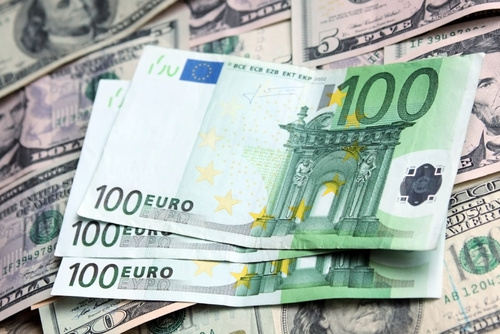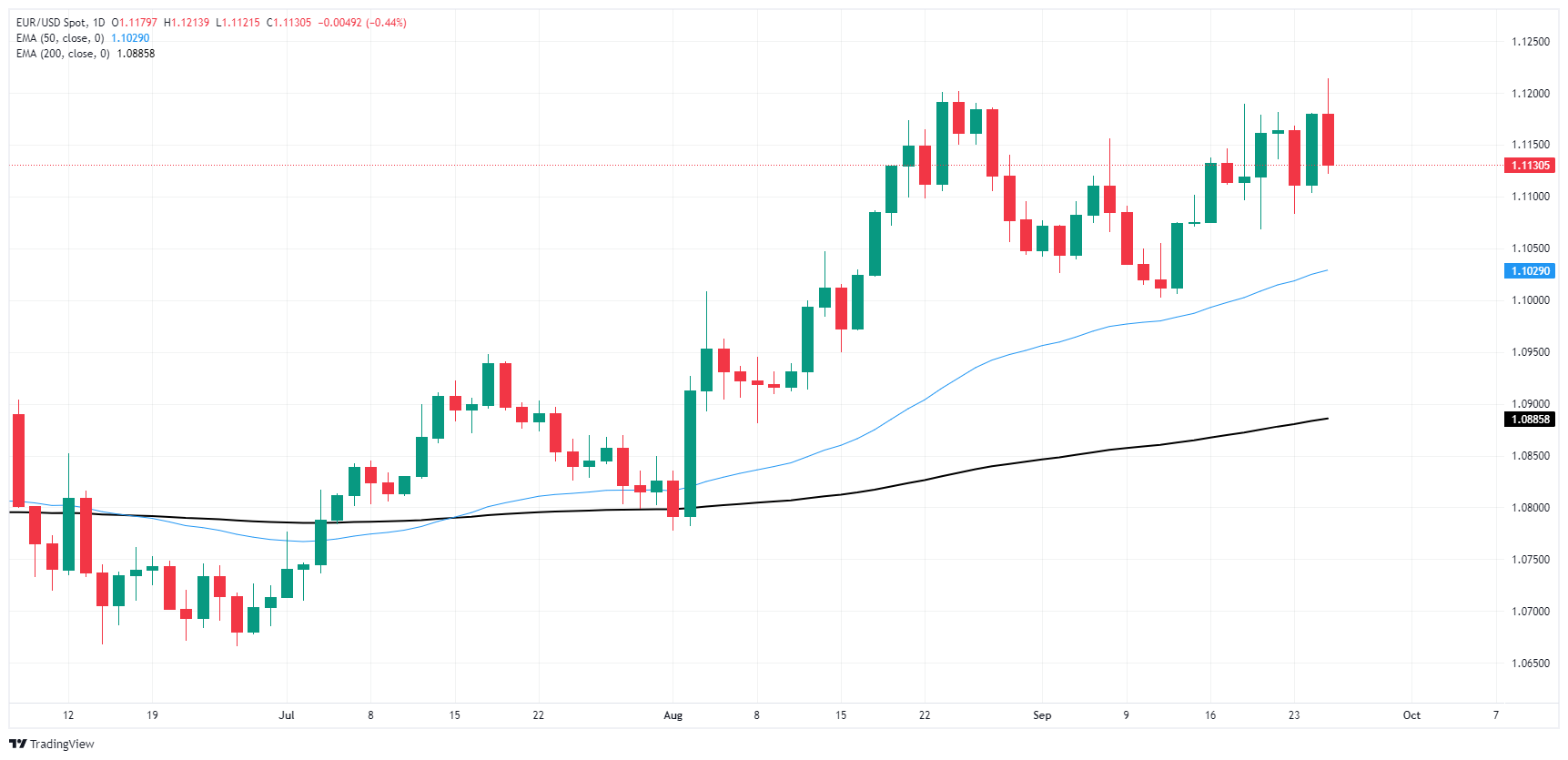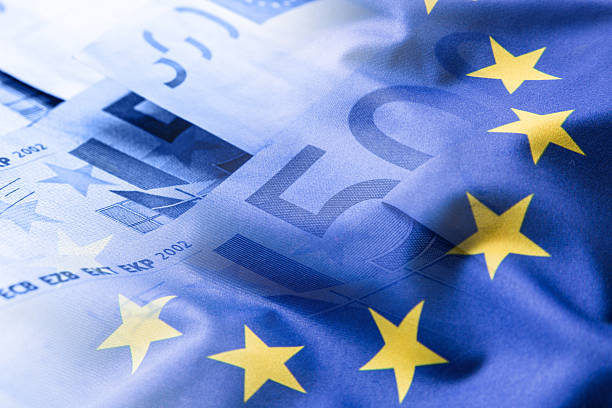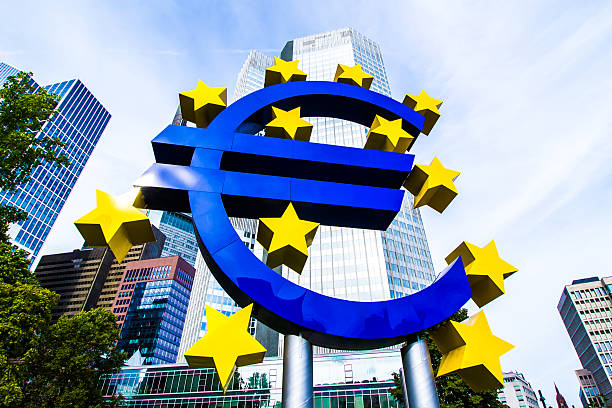EUR/USD faces harsh rejection from 1.12 amid Greenback bounce

- EUR/USD fell four-tenths of a percent after flubbing the 1.12 handle on Wednesday.
- Markets pivoted into Greenback bids in the midweek market session.
- US economic data and Fedspeak to dominate market cycle for the rest of the week.
EUR/USD pulled back on Wednesday, tumbling back through the 1.1200 handle and falling into familiar near-term congestion just north of 1.1100. Fiber shed nearly half of a percent after briefly setting a new 14-month high this week.
Thursday brings an entire raft of speeches from central banks, with an appearance from European Central Bank (ECB) President Christine Lagarde, as well as talking points from ECB Executive Board Member Isabel Schnabel. Friday will follow with a full slates of consumer and business sentiment surveys for September from the pan-EU economic area.
US consumer confidence indicators fell this week as the average US consumer doesn’t share in the stock market’s exuberance over Fed rate cuts, with key confidence readings falling to their lowest levels in three years and consumer inflation expectations for the next 12 months ticking higher. This Friday will see a fresh update to US Personal Consumption Expenditure (PCE) inflation figures.
New home sales also fell in August, declining 4.7% to 716K from the previous month’s revised 751K. Meanwhile, investors will see another print of US Gross Domestic Product (GDP) growth for the second quarter, expected to hold steady at 3.0% on an annualized basis. Thursday will also bring a slew of speeches and public appearances from several Fed officials, including Fed Chair Jerome Powell.
Economic Indicator
New Home Sales Change (MoM)
The number of New Home sales released by the US Census Bureau is an important measure of housing market conditions. House buyers spend money on furnishing and financing their homes so as a result the demand for goods, services and the employees is stimulated. Generally, a high reading is seen as bullish for the USD, whereas a low reading is seen as bearish.
Read more.
Last release: Wed Sep 25, 2024 14:00
Frequency: Monthly
Actual: -4.7%
Consensus: -
Previous: 10.6%
Source: US Census Bureau
EUR/USD price forecast
Despite notching in a quick, fresh 14-month high on Wednesday, Fiber tumbled back through the 1.1200 handle in short order, plunging back into near-term consolidation after markets pivoted back into bidding the Greenback higher. EUR/USD is still deep in bull country, trading well north of the 50-day Exponential Moving Average (EMA) near 1.1030.
EUR/USD daily chart
Euro FAQs
What is the Euro?
The Euro is the currency for the 20 European Union countries that belong to the Eurozone. It is the second most heavily traded currency in the world behind the US Dollar. In 2022, it accounted for 31% of all foreign exchange transactions, with an average daily turnover of over $2.2 trillion a day. EUR/USD is the most heavily traded currency pair in the world, accounting for an estimated 30% off all transactions, followed by EUR/JPY (4%), EUR/GBP (3%) and EUR/AUD (2%).
What is the ECB and how does it impact the Euro?
The European Central Bank (ECB) in Frankfurt, Germany, is the reserve bank for the Eurozone. The ECB sets interest rates and manages monetary policy. The ECB’s primary mandate is to maintain price stability, which means either controlling inflation or stimulating growth. Its primary tool is the raising or lowering of interest rates. Relatively high interest rates – or the expectation of higher rates – will usually benefit the Euro and vice versa. The ECB Governing Council makes monetary policy decisions at meetings held eight times a year. Decisions are made by heads of the Eurozone national banks and six permanent members, including the President of the ECB, Christine Lagarde.
How does inflation data impact the value of the Euro?
Eurozone inflation data, measured by the Harmonized Index of Consumer Prices (HICP), is an important econometric for the Euro. If inflation rises more than expected, especially if above the ECB’s 2% target, it obliges the ECB to raise interest rates to bring it back under control. Relatively high interest rates compared to its counterparts will usually benefit the Euro, as it makes the region more attractive as a place for global investors to park their money.
How does economic data influence the value of the Euro?
Data releases gauge the health of the economy and can impact on the Euro. Indicators such as GDP, Manufacturing and Services PMIs, employment, and consumer sentiment surveys can all influence the direction of the single currency. A strong economy is good for the Euro. Not only does it attract more foreign investment but it may encourage the ECB to put up interest rates, which will directly strengthen the Euro. Otherwise, if economic data is weak, the Euro is likely to fall. Economic data for the four largest economies in the euro area (Germany, France, Italy and Spain) are especially significant, as they account for 75% of the Eurozone’s economy.
How does the Trade Balance impact the Euro?
Another significant data release for the Euro is the Trade Balance. This indicator measures the difference between what a country earns from its exports and what it spends on imports over a given period. If a country produces highly sought after exports then its currency will gain in value purely from the extra demand created from foreign buyers seeking to purchase these goods. Therefore, a positive net Trade Balance strengthens a currency and vice versa for a negative balance.








